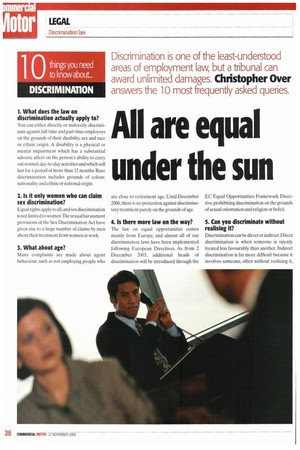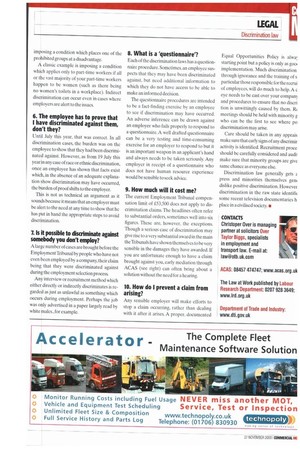All are equal under the sun
Page 38

Page 39

If you've noticed an error in this article please click here to report it so we can fix it.
Discrimination is one of the least-understood areas of employment law, but a tribunal can award unlimited damages. Christopher Over answers the 10 most frequently asked queries.
0 things you need to know about..
DISCRIMINATION
1. What does the law on discrimination actually apply to?
You can either directly or indirectly discriminate against full-time and part-time employees on the grounds of their disability, sex and race or ethnic origin. A disability is a physical or mental impairment which has a substantial adverse affect on the person's ability to carry out normal, day-to-day activities and which will last for a period of more than 12 months. Race discrimination includes grounds of colour, nationality and ethnic or national origin.
2. Is it only women who can claim sex discrimination?
Equal rights apply to all and sex discrimination is not limited to women.The sexual harassment provisions of the Sex Discrimination Act have given rise to a large number of claims by men about their treatment from women at work.
3. What about age?
Many complaints are made about ageist behaviour, such as not employing people who are close to retirement age. Until December 2006, there is no protection against discriminatory treatment purely on the grounds of age.
4. Is there more law on the way?
The law on equal opportunities comes mainly from Europe, and almost all of our discrimination laws have been implemented following European Directives. As from 2 December 2003, additional heads of discrimination will be introduced through the EC Equal Opportunities Framework Directive, prohibiting discrimination on the grounds of sexual orientation and religion or belief.
5. Can you discriminate without realising it?
Discrimination can be direct or indirect. Direct discrimination is when someone is openly treated less favourably than another. Indirect discrimination is far more difficult because it involves someone, often without realising it, imposing a condition which places one of the prohibited groups at a disadvantage.
A classic example is imposing a condition which applies only to part-time workers if all or the vast majority of your part-time workers happen to be women (such as there being no women's toilets in a workplace). Indirect discrimination can occur even in cases where employers are alert to the issues.
6. The employee has to prove that I have discriminated against them, don't they?
Until July this year, that was correct. In all discrimination cases, the burden was on the employee to show that they had been discriminated against. However, as from 19 July this year in any case of race or ethnic discrimination, once an employee has shown that facts exist which, in the absence of an adequate explanation show discrimination may have occurred, the burden of proof shifts to the employer.
This is not as technical an argument as it sounds because it means that an employer must be alert to the need at any time to show that he has put in hand the appropriate steps to avoid discrimination.
7. Is it possible to discriminate against somebody you don't employ?
A large number of cases are brought before the Employment Tribunal by people who have not even been employed by a company, their claim being that they were discriminated against during the employment selection process.
Any interview or recruitment method which either directly or indirectly discriminates is regarded as just as unlawful as something which occurs during employment. Perhaps the job was only advertised in a paper largely read by white males., for example.
8. What is a 'questionnaire'?
Each of the discrimination laws has a questionnaire procedure. Sometimes, an employee suspects that they may have been discriminated against, but need additional information to which they do not have access to be able to make an informed decision.
The questionnaire procedures are intended to be a fact-finding exercise by an employee to see if discrimination may have occurred. An adverse inference can be drawn against an employer who fails properly to respond to a questionnaire. A well drafted questionnaire can be a very testing and time-consuming exercise for an employer to respond to but it is an important weapon in an applicant's hand and always needs to be taken seriously. Any employer in receipt of a questionnaire who does not have human resource experience would he sensible to seek advice.
9. How much will it cost me?
The current Employment Tribunal compensation limit of £53,500 does not apply to discrimination claims. The headlines often refer to substantial orders, sometimes well into six figures. These are, however, the exceptions. Though a serious case of discrimination may give rise to a very substantial award in the main the Tribunals have shown themselves to be very sensible in the damages they have awarded. if you are unfortunate enough to have a claim brought against you, early mediation through ACAS (see right) can often bring about a solution without the need for a hearing.
10. How do I prevent a claim from arising?
Any sensible employer will make efforts to stop a claim occurring, rather than dealing with it after it arises. A proper. documented Equal Opportunities Policy is alwa: starting point but a policy is only as gool implementation. Much discrimination through ignorance and the training of s particular those responsible for the recrui of employees, will do much to help. A c eye needs to be cast over your compan) and procedures to ensure that no discri tion is unwittingly caused by them. Rc meetings should be held with minority g who can be the first to see where po discrimination may arise.
Care should be taken in any apprais make sure that early signs of any discrimir activity is identified. Recruitment proce should be carefully considered and audii make sure that minority groups are give same chance as everyone else.
Discrimination law generally gets z press and minorities themselves gem dislike positive discrimination. However discrimination in the raw state identifit some recent television documentaries h place in a civilised society. • CONTACTS Christoper Over is managing partner at solicitors Over Taylor Biggs, specialists in employment and transport law. E-mail at: law@otb.uk.com


























































































































































































